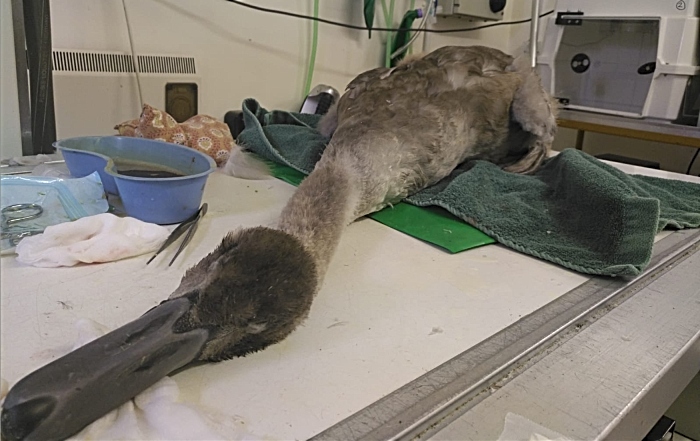
A cygnet who swallowed a large fishing hook has been saved by RSPCA staff in Nantwich.
And the incident has prompted the charity to urge anglers to take litter home with them.
The bird was rescued from a lake in Yorkshire with a 7cm-long fishing hook in his throat and fishing line wrapped around his esophagus.
He was taken to a local vet but was transferred to the RSPCA’s Stapeley Grange wildlife centre in Nantwich as his injuries needed more specialist care.
Vets at the centre put a camera down the cygnet’s throat and managed to untangle the 7cm hook and 15cm-long line which had left deep and infected wounds in the bird’s throat.
He is now recovering in the centre’s isolation unit and it is hoped he will be released back into the wild soon.
Lee Stewart, manager at Stapeley Grange, said: “This cygnet had a very lucky escape as he could have been much more seriously injured.”
The cygnet isn’t the only bird to be at Stapeley Grange because of fishing litter injuries – there are currently four other birds in isolation who are also being treated there after getting tangled in fishing line or swallowing hooks.
The centre also has a number of birds in outdoor enclosures that are also recovering from fishing litter injuries.
“If someone had disposed of their fishing litter correctly in the first place, then these birds would never have needed to have come into our care,” said Lee.
“Most anglers do clean up after themselves but sadly there are a quite few who don’t and this is what happens when fishing litter is left lying about.
“We do see a lot of instances like this at Stapeley Grange – we wish we didn’t see anything like this at all, it is so frustrating for the team.
“Just a little thought and care could save an animal’s life, so we urge all anglers to take their litter home with them.”
Last year, the RSPCA rescued 678 animals from fishing litter, of which 463 were wild birds.
For information about about to dispose of your fishing litter properly, visit www.rspca.org.uk/adviceandwelfare/litter/fishing
Top tips include:
● Take unwanted fishing line home and cut it into pieces before putting in the bin
● Be aware of surrounding trees – discarded line caught in foliage causes problems for wildlife
● Don’t leave bait unattended – always remove from the hook and put in safe place
● Use a bait box
● Dispose of any litter you see, even if it’s not your own



















SEVEN (!) cm long – what on earth were they fishing for? Discarding any hooks or line is completely irresponsible but this sounds amateurish and ignorant as well.